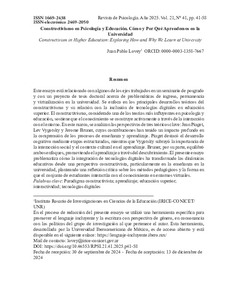Por favor, use este identificador para citar o enlazar este ítem:
https://repositorio.uca.edu.ar/handle/123456789/19993| Título: | Constructivismo en psicología y educación. Cómo y por qué aprendemos en la universidad Constructivism in Higher Education: Exploring How and Why We Learn at University |
Autor: | Lovey, Juan Pablo | Palabras clave: | CONSTRUCTIVISMO; APRENDIZAJE; TECNOLOGIA DIGITAL | Fecha de publicación: | 2025 | Editorial: | Pontificia Universidad Católica Argentina. Facultad de Psicología y Psicopedagogía | Resumen: | Este ensayo está relacionado con algunos de los ejes trabajados en un seminario de posgrado y con un proyecto de tesis doctoral acerca de problemáticas de ingreso, permanencia y virtualización en la universidad. Se enfoca en los principales desarrollos teóricos del constructivismo y su relación con la inclusión de tecnologías digitales en educación superior. El constructivismo, considerado una de las teorías más influyentes en psicología y educación, sostiene que el conocimiento se construye activamente a través de la interacción con el entorno. En este marco, se analizan las perspectivas de tres teóricos clave: Jean Piaget, Lev Vygotsky y Jerome Bruner, cuyas contribuciones han tenido un impacto profundo en la comprensión de los procesos de enseñanza y aprendizaje. Piaget destacó el desarrollo cognitivo mediante etapas estructuradas, mientras que Vygotsky subrayó la importancia de la interacción social y el contexto cultural en el aprendizaje. Bruner, por su parte, equilibró ambos enfoques, promoviendo el aprendizaje a través del descubrimiento. El presente ensayo problematiza cómo la integración de tecnologías digitales ha transformado las dinámicas educativas desde una perspectiva constructivista, particularmente en la enseñanza en la universidad, planteando una reflexión crítica sobre los métodos pedagógicos y la forma en que el conjunto de estudiantes interactúa con el conocimiento en entornos virtuales. This essay builds on key themes explored in a graduate seminar and is linked to a doctoral thesis project examining the challenges of university access, retention, and the increasing use of virtual learning. It focuses on the main theoretical developments of constructivism and its connection to the integration of digital technologies in higher education. Constructivism, regarded as one of the most influential theories in psychology and education, posits that knowledge is actively constructed through interaction with the environment. Within this framework, the perspectives of three key theorists are examined: Jean Piaget, Lev Vygotsky, and Jerome Bruner, whose contributions have profoundly shaped our understanding of learning. Piaget emphasized cognitive development through structured stages, while Vygotsky highlighted the role of social interaction and cultural context in the learning process. Bruner, in turn, blended both approaches, advocating for discovery-based learning. The essay critically examines how the integration of digital technologies has reshaped educational dynamics from a constructivist standpoint, particularly in higher education, prompting a reflection on pedagogical methods and how students engage with knowledge in virtual settings. Ultimately, the essay explores both the opportunities and challenges that digital tools present for the active construction of knowledge, offering insights and raising questions that contribute to the ongoing debate about the growing virtualization of higher education from a constructivist perspective. |
URI: | https://repositorio.uca.edu.ar/handle/123456789/19993 | ISSN: | 2469-2050 (online) 1669-2438 (impreso) |
Disciplina: | PSICOLOGIA | DOI: | 10.46553/RPSI.21.41.2025.p41-58 | Derechos: | Atribución-NoComercial-CompartirIgual 4.0 Internacional | Fuente: | Revista de Psicología. 2025, 21 (41) |
| Aparece en las colecciones: | RdP - 2025 Vol. 21 nro. 41 |
Ficheros en este ítem:
| Fichero | Descripción | Tamaño | Formato | |
|---|---|---|---|---|
| constructivismo-psicología-ducacion.pdf | 379,29 kB | Adobe PDF |  Visualizar/Abrir |
Este ítem está sujeto a una Licencia Creative Commons

